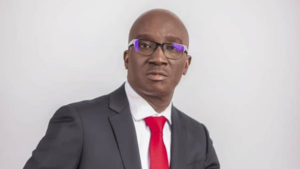What Does Governor Okpebholo’s Suspension of Revenue Collections Mean for the State and Its Economy?

What Does Governor Okpebholo’s Suspension of Revenue Collections Mean for the State and Its Economy?
Both local business owners and economic analysts have taken notice of Governor Okpebholo’s unexpected announcement that all revenue collections throughout the state will be suspended. The ruling has sparked debate and conjecture over how it would affect the general public’s life, the government, and the economy. Is this the start of a more comprehensive policy change, or is it a short-term fix meant to address economic issues? Let’s examine what this decision means for the state, its people, and its future as the ramifications continue to develop.
Many have been caught off guard by Governor Okpebholo’s decision to halt all income collections. Government funding is largely derived from revenue collections, which support infrastructure and vital services. Governor Okpebholo is boldly expressing his administration’s current priorities by stopping these collections. According to people close to the governor’s office, this action might be taken to help people and companies who are struggling financially. What does this actually mean for state budgets, though? Is it a brief pause or a sign of more significant economic changes to come?
Suspensions of revenue collection can provide small and medium-sized businesses (SMEs) with instant relief. The burden of taxes, levies, and fees causes many firms to struggle financially. The administration of Governor Okpebholo may be giving SMEs the breathing room they require to stabilize, expand, and eventually make a more significant contribution to the state’s economy by halting revenue collections. Businesses may be able to extend their services, recruit more staff, or reinvest in their operations as a result of this ruling, all of which could boost economic growth. Owners of businesses have already expressed their confidence that this ruling will boost the local economy by enabling them to continue operating without the constant financial strain of state duties.
The government’s capacity to finance public services and initiatives, ranging from infrastructure projects to healthcare and education, is called into question by the standstill in revenue collection. For these services to continue operating, steady income streams are essential. Some experts are concerned that the state may experience a decline in the caliber and accessibility of these programs if quick changes are not made. In order to prevent interruptions, the administration of Governor Okpebholo has allegedly acknowledged these worries and is looking into alternate funding options. This action might also lead to conversations about external funds, public-private partnerships, and other funding sources that could lessen the impact of the suspension on critical services.
Although some people are applauding the postponement of income collections, financial experts are concerned. On the one hand, this action might boost short-term corporate investment and consumer spending, which would boost economic activity. However, because of the state’s reliance on internal revenue, a protracted suspension would result in budget deficits, which could have an impact on long-term stability and government responsibilities. The government of Governor Okpebholo has stated that it is confident the suspension is only temporary and won’t be in place indefinitely. However, this ruling draws attention to the thin line separating fiscal risk and economic stimulation, sparking discussions among policy experts about whether the immediate advantages justify any potential long-term drawbacks.
Governor Okpebholo’s audacious choice might be a reflection of his larger goal of creating an economy that is more resilient and self-sufficient. By giving residents’ and businesses’ relief top priority, he seems intent on laying the groundwork for economic expansion that is not unduly reliant on tax income. This strategy might portend a future move away from traditional tax collecting and toward policies that prioritize job creation, innovation, and private sector empowerment. Both residents and experts are eager to see if Governor Okpebholo would enact more reforms that could change the state’s economic landscape in the upcoming years as his government works through the difficulties of this suspension.
The decision by Governor Okpebholo to halt all tax collection has changed the political and economic climate of the state. There are still concerns regarding the long-term effects on government stability and public services as both citizens and companies adapt to this change. Although the decision’s immediate implications seem hopeful for local firms, the entire impact will only become apparent with time. Will Governor Okpebholo’s plan lead to a surge in economic growth, or might the suspension turn out to be dangerous in the end? One thing is clear as we observe this strategy in action: Governor Okpebholo’s leadership is charting a daring new direction for the state.
Do you find Tmaq Media useful? Click here to give us five stars rating!



















